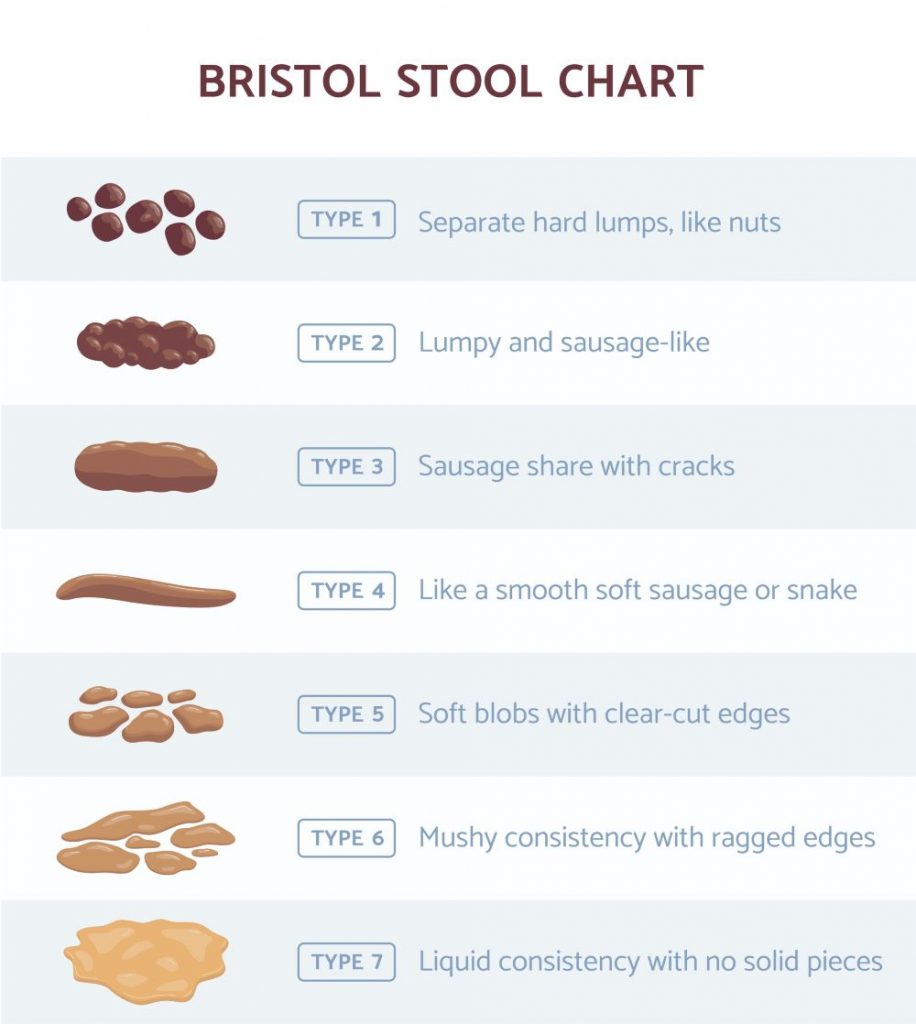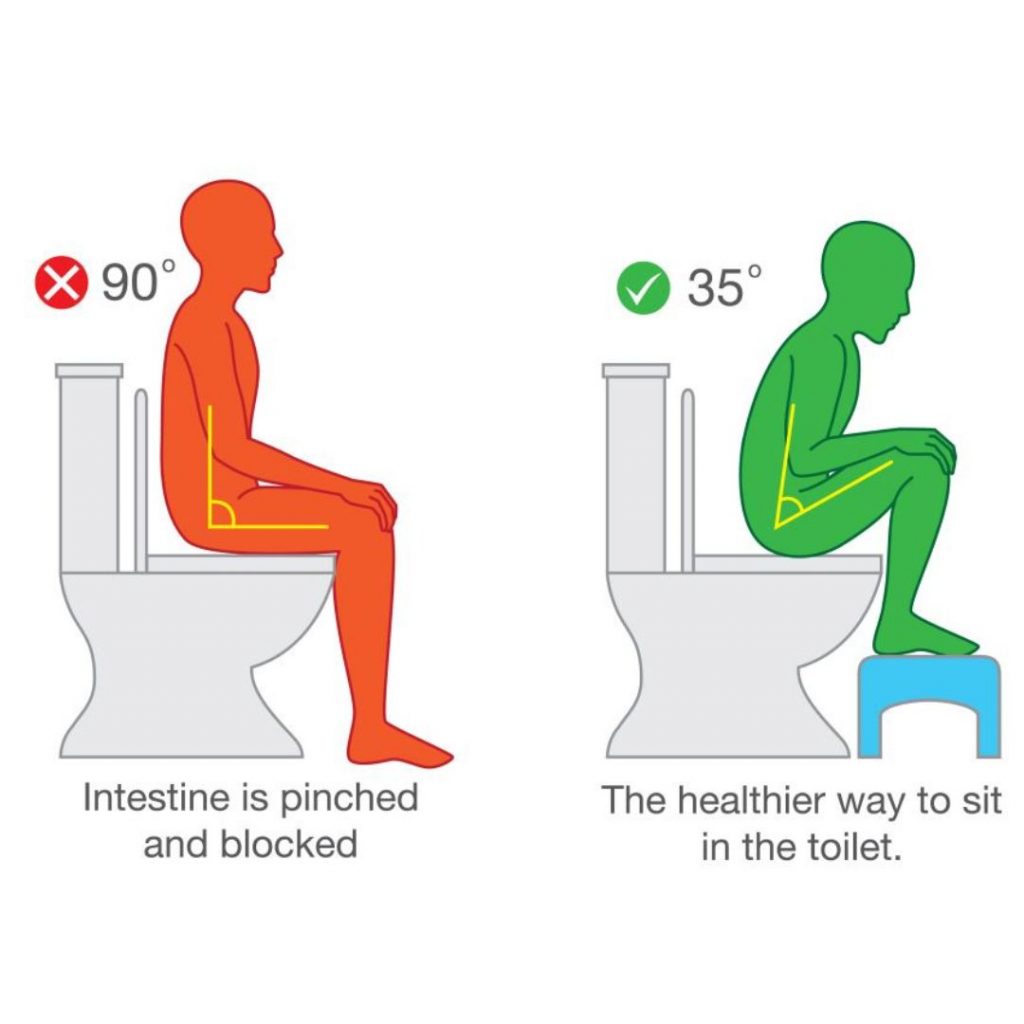
What is Constipation?
Constipation is usually defined as having less than 3 bowel movements a week. These movements may be hard, lumpy, hard to pass or even painful. Constipation is a common problem affecting around 1 in 7 people. In those with IBS, constipation affects around half of sufferers.
How Do You Know if You’re Constipated?
Check your stools to see where you are on the stool chart. The goal is number 4. If your stools resemble Type 1, 2 or 3, you are likely to be constipated.

Causes of Constipation
Constipation can be debilitating and distressing. There are a number of reasons why constipation can occur. These are not limited to, but include:
- Dehydration
- Diet (lack of fibre and wholefoods)
- Stress
- Microbiome, in particular increased Methane producing archaea in the small intestine
- Hormonal fluctuations/ pregnancy
- Low serotonin/ depression
- Structural: Cancer, stricture, prolapse
- Certain medications (antidepressants, iron, opioids)
- EDS (Ehlers-Danlos syndrome)
- Hypothyroidism
- Eating disorders
How to Relieve Constipation
- Increase fibre each day
Aim for 30-35g a day. This can be a mixture of soluble and insoluble fibre; however soluble fibre is better for relieving constipation. The following foods and food swaps may help improve constipation.
- Porridge oats with chia and flaxseeds
- Flaxseed rolls
- Chia porridge
- Adding beans and lentils to soups and casseroles
- Eat sweet potato and parsnips at meals
- Increase nuts and seeds
- Have avocado with meals
- Make a white bean mash instead of potato
- Choose red lentil pasta over wheat
- Enjoy butternut squash and pumpkins (roasted or in soups)
- Add dried figs, prunes or apricots to your breakfast
- Add chia or flaxseeds to your smoothies
Soluble or Insoluble Fibre?
Most foods have a combination of soluble and insoluble fibre. There is an easy way to know if your fibre is soluble or insoluble. Soluble fibre dissolves in hot water, insoluble fibre does not.
Examples of Soluble Fibre
Avocado, kiwi, black beans, lima beans, kidney beans, lentils, tofu, oats, barley, oranges and citrus fruits, strawberries, figs, prunes, dried apricots, nectarines, apricots, apples, pears, Brussels sprouts, sweet potato, parsnips, broccoli, turnips, carrots, flaxseeds, chia seeds, psyllium, hazelnuts, sunflower seeds.
Examples of Insoluble Fibre
Bran, husk, wheat, cauliflower, potato skin, peas, brown rice, chickpeas, wholegrains, cereals.
2. Enjoy around half a plate of vegetables at mealtimes.
Make a quarter of your plate starch vegetables, such as sweet potato, parsnips, butternut squash as well as healthy avocado and leave 1⁄4 of your plate for lean proteins.
3. Make olive oil your main fat when cooking
with some butter or ghee and some cold pressed oils such as flaxseed.
4. CHEW your food.
We so often forget. Your stomach doesn’t have teeth so chew each mouthful around 30 times or until your food becomes a paste.
5. Drink plenty of water
Aim for 1.5-2 litre every day. Try a glass of warm water on waking.
6. Take 7-10g psyllium husk daily
Stir into water or food, taken just after or with a meal
7. Add 2 kiwi fruits to your diet. Research has shown this to be more effective than eating prunes. Even better, wash and eat with the skin. Research has shown that eating 2 kiwi fruit daily for 4 weeks increased frequency and reduced transit time Another study showed that the kiwi resulted is softer, bulker stools. This is thought be be due to the high water holding capacity of kiwi alongside an enzyme called Actinidin.
8. Eat 1-2 flaxseed rolls a day (see my recipe!). Flaxseeds are rich in soluble fibre which can help to bulk the stool and make for them easier to pass.
9. Coffee can help! Coffee, even decaffeinated coffee can stimulate motility in the colon. This is not solely down to caffeine, but potentially other compounds in the coffee bean.
10. Keep moving. Walking is great, as is yoga. Regular movement helps support normal peristalsis in the gut.
11. Try correcting your posture in the bathroom.

Knees elevated above hips
Lean forward, spine straight, hands on knees
Try deep diaphragm breathing
Supplements for Constipation
- Digestive enzymes can be helpful, especially if there is also fat sensitivity. Fats can stimulate colonic contractions and can be a trigger in IBS
- Consider a Magnesium citrate or carbonate supplement which has an osmotic effect in the gut and is also a muscle relaxant. Bought as a powder it can be dosed up and down so that you find the perfect dosage for you. Take before bed
- Probiotics may be helpful such as Lactobacillus Reuteri which may improve stool frequency or reduce methane in the breath or Bifidobacterium lactis which may increase transit time (Mitten et al. Am J G. 2018 Ojettiet al. 2014 & 2017)
- Take a prebiotic fibre. This can help to top up beneficial bacteria and adds bulk to the stool. PHGG (partially hydrolysed guar gum) is particularly beneficial as it is less likely to cause bloating
Brands I like
Remember I am a nutritionist, but I am not your nutritionist so please speak to a professional health care practitioner, who understands your health needs first.
1. Viridian Magnesium Citrate Powder / MAG365 Powdered magnesium supplement. These are both dissolved into water before consuming. Ther upper daily limit is 350mg daily as too much may lead to gut issues and diarrhoea. A starting dose at night would be around 200-400mg. Magnesium Oxide is also sometimes recommeded for chronic constipation.
2. Healthy Origins Healthy Fibre Sunfiber or PHGG Powder – Partially hydrolysed guar gum. Full dosage 7.5g daily – start slowly and build up. Drink plenty of water with this supplement. PHGG absorbs water in the stool, bulking it out and making the stool easier to pass. It is also a prebiotic which can improve stool ph as and encourage healtier strains of bacteria, such as Lactobacillus as well as boosting stool frequency.
3. Nutrigold Psyllium Husk Fibre 300g. Dosage is around 2-3 teaspoons daily. Add to smoothies, yogurt or porridge.
4. Probiotics such as Biogaia Gastrus chewable tablets, Symprove, Optibac Bifido fibre, Proven probiotics, Cytoplan Cytobiotic active or Acidphilus plus.
About Dominique Ludwig, Nutritionist MSc and Nutritional Therapist mBANT
Dominique Ludwig is an accomplished Nutritionist with over 30 years’ experience as a qualified nutritionist and 16 years as a nutritional therapist. The secret weapon of many high-profile clients and A-list celebrities, Dominique has been voted one of the top 15 nutritionists in the UK.
She is the founder of the Nutrition and Lifestyle Programme Renew Reset Recharge®. This is a pioneering nutrition, weight management and lifestyle programme all rolled into one. Working out of her busy practice and Meyer Clinic, Dominique has helped over a thousand clients, globally, live healthier lives. She is a regular contributor to The Times, The Sunday Times and Times 2.
Recipes to help relieve constipation
- Chia Porridge Hot and Cold CLICK HERE
- Flaxseed Rolls CLICK HERE
- Berry Chia Spiced Smoothie CLICK HERE
Nutrition Advice for constipation?
If you would like help with your digestion or health, you may find that a personalised nutrition consultation would be of benefit to you. This is a tailored approach where Dominique Ludwig personalises all her recommendations around your health, your body and your lifestyle.
- To find out more about Personalised Nutrition CLICK HERE
- Renew Reset Recharge is a successful nutrition, weight management and lifestyle food programme which has helped many people improve their digestive health.The recipes are high in fibre and completely balanced for you. To find out more about the programme, CLICK HERE
About the Author, Dominique Ludwig, Nutritionist MSc and Nutritional Therapist mBANT
Dominique Ludwig is Nutritionist MSc. and registered Nutritional Therapist mBANT with 30 years experience in nutrition. Any advice on constipation given is general advice only for healthy individuals. If you would like to work with Dominique, please contact her via the Dominique Ludwig website or book a DISCOVERY CALL
DISCLAIMER
Features published by Dominique Ludwig are not intended to treat, diagnose, cure or prevent any disease. Always seek the advice of your GP or another qualified healthcare provider for any questions you have regarding a medical condition, and before undertaking any diet, exercise or other health-related programme.
References:
- Cuomo, R. et al. (2015) “Partially hydrolyzed guar gum in the treatment of irritable bowel syndrome with constipation: Effects of gender, age, and body mass index,” Saudi Journal of Gastroenterology, 21(2), p. 104. Available at: https://doi.org/10.4103/1319-3767.153835.
- Ford, A.C., et al., American college of gastroenterology monograph on the management of irritable bowel syndrome and chronic idiopathic constipation. Am J Gastroenterol, 2014. 109 Suppl 1: p. S2-S26.
- Chang, C.C., et al., Kiwifruit improves bowel function in patients with irritable bowel syndrome with constipation. Asia Pac J Clin Nutr, 2010. 19(4): p. 451-7.
- Rush, E.C., et al., Kiwifruit promotes laxation in the elderly. Asia Pac J Clin Nutr, 2002. 11(2): p. 164-8.
- Chan, A.O., et al., Increasing dietary fiber intake in terms of kiwifruit improves constipation in Chinese patients. World J Gastroenterol, 2007. 13(35): p. 4771-5.
- Pastorello, E.A., et al., Identification of actinidin as the major allergen of kiwi fruit. J Allergy Clin Immunol, 1998. 101(4 Pt 1): p. 531-7.
- Boland, M. J. (2013). Kiwifruit proteins and enzymes: actinidin and other significant proteins. In: Advances in Food and Nutrition Research: Nutritional Benefits of Kiwifruit, pp. 59–80. Boland, M. and Moughan, P. J. (Eds.), Academic Press, Amsterdam, The Netherlands. .
- Montoya, C.A., et al., Actinidin from kiwifruit (Actinidia deliciosa cv. Hayward) increases the digestion and rate of gastric emptying of meat proteins in the growing pig. Br J Nutr, 2014. 111(6): p. 957-67.




